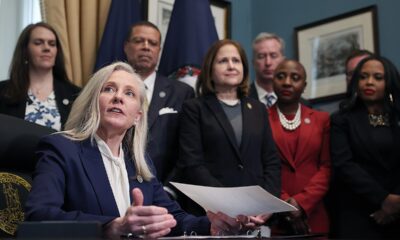Maryland
Let’s make Maryland ‘open for business’ again | GUEST COMMENTARY

Last month, Google unveiled plans to invest more than $1 billion to expand its data centers in Virginia. The investment promises to create hundreds of jobs and serve as an economic engine, generating tax revenue not only in Loudon and Prince William counties, where the centers are to be located, but throughout the entire state. For Virginia, this sort of economic development is not unprecedented. The state is currently ranked as the second-best state for business in the nation.
Meanwhile, Maryland stands at a crossroads, holding the necessary ingredients to be one of the most competitive states but consistently losing out to those around us. Maryland beat Virginia in job growth for four consecutive years between 2015-2018. Maryland was open for business then, and we can be again.
With a prime location in the mid-Atlantic, world-renowned academic research institutions such as Johns Hopkins and the University of Maryland, and a highly skilled workforce that ranks among the best in the nation, it should be a top destination for businesses. Yet Maryland does not rank in the top 10.
Our inability to attract business has a tangible impact on the lives of everyday Marylanders. In January, our comptroller released a report indicating that our economy has not seen substantial growth since 2017. Between the lack of new economic opportunities and persistently surging costs, we are witnessing a decline in the state’s residents and a widening gap between Virginia and Maryland’s economic growth.
As we look to reverse this trend, Maryland must do more to incentivize growth and reduce bureaucratic obstacles.
By offering tax incentives and grants, the Commonwealth was able to reign in billions of dollars in investment from companies like Amazon. More broadly, in 2023, the industry provided the state with over 26,000 jobs, $640 million in state tax revenue, and $47 billion in total economic output.
Recognizing the value data centers can bring, former Gov. Larry Hogan took proactive steps to provide tax incentives to encourage data center development in 2020. While current Gov. Wes Moore is continuing the momentum by providing new incentives in this year’s session, such as streamlining regulatory processes for the industry, we have not addressed the other central issue for Maryland’s economy: overregulation.
This past session, that issue became even worse. Counterintuitive to Governor Moore’s goal of bringing data center growth to our state and uplifting small businesses, lawmakers passed significant, overreaching data privacy legislation. While their intent was reasonable, the legislation they finalized will severely hamstring small business owners across the state, while continuing to pull back the welcome mat from future investments.
Contrary to Virginia’s sensible and clear opt-out provision, Maryland’s new privacy bill essentially calls for our state’s businesses to secure opt-in agreements for processes like customized online experiences and ad measurement. Not even California, the first state to enact major privacy legislation, requires such a provision. As a result, only larger firms with deep pockets will be able to effectively reach their target audiences online and manage the compliance requirements required to do so — harming the vibrant competition in our state’s economy and putting small, locally grown businesses at a steep disadvantage.
As Governor Moore works toward welcoming meaningful investments in the state, we should hope the administration keeps in mind the need to improve our competitive positioning in the region. To break this trend, our course is clear: take a page from Virginia’s playbook and cut out unnecessary red tape while encouraging the growth of promising new industries. By taking these sensible steps, we can unleash Maryland’s full potential and once again make Maryland Open for Business.
Michael Gill (mgill@evergreenadvisorsllc.com) served as Maryland’s secretary of commerce from 2015-’19 and 2022-’23. He also served as the state’s secretary of business and economic development in 2015, among other roles.

Maryland
Howard County police investigate fatal officer-involved shooting in Columbia

COLUMBIA, Md. (WBFF) — An adult man was killed in a police-involved shooting in Columbia early Sunday, prompting an investigation by the Maryland Attorney General’s Independent Investigations Division.
Howard County police said officers were called on March 1, at about 12:09 a.m., to an apartment building in the 6400 block of Freetown Road for a report that involved an adult male threatening to harm himself.
According to police, at about 12:22 a.m., officers encountered the man outside the building. The man approached officers while holding a knife and ignored commands to drop the weapon, police said. Officers then shot the man.
ALSO READ | Gas leak explosion, fire in Prince George’s County leaves 1 injured
Officers attempted life-saving measures, but the man was pronounced dead at the scene. Officersrecovered a knife near the man.
No officers were injured, and the officers were equipped with body-worn cameras.
The Independent Investigations Division is investigating.
Anyone with information about this incident, including cell phone or private surveillance video, is asked to contact the IID at (410) 576–7070 or by email atIID@oag.maryland.gov.
The IID willgenerally releasethe name of the decedent and any involved officers within two business days of the incident, although that period may be extended, if necessary,pursuant toIID protocol.
JOIN THE CONVERSATION (4)
TheIID willgenerally releasebody-worn camera footage within 20 business days of an incident. There may be situations where more than 20 days is necessary, including if investigators need more time to complete witness interviews, if there are technical delays caused by the need to shield the identities of civilian witnesses, or to allow family members to view the video before it is released to the public.
Maryland
AM showers Sunday in Maryland

Maryland
Pilot killed after small plane crashes in woods of Hollywood, Maryland

Aircraft located in wooded area
HOLLYWOOD, Md. – First responders, including Maryland State Police from the Leonardtown Barrack, deputies from the St. Mary’s County Sheriff’s Office and EMS, responded to the area.
Maryland State Police Aviation Command assisted in the search and ultimately located the aircraft in a wooded area.
Preliminary investigation indicates a small ultralight aircraft crashed for reasons that remain under investigation.
Pilot pronounced dead
Authorities said the operator was the sole occupant of the aircraft and was pronounced dead at the scene.
The identity of the pilot has not been released pending notification of next of kin.
Officials said no photos of the crash scene will be released.
Investigation ongoing
The Maryland Aviation Administration and the National Transportation Safety Board have been notified.
The investigation remains active.
The Source: This article was written using information provided by local emergency officials.
-

 World4 days ago
World4 days agoExclusive: DeepSeek withholds latest AI model from US chipmakers including Nvidia, sources say
-

 Massachusetts4 days ago
Massachusetts4 days agoMother and daughter injured in Taunton house explosion
-

 Montana1 week ago
Montana1 week ago2026 MHSA Montana Wrestling State Championship Brackets And Results – FloWrestling
-

 Denver, CO4 days ago
Denver, CO4 days ago10 acres charred, 5 injured in Thornton grass fire, evacuation orders lifted
-

 Louisiana7 days ago
Louisiana7 days agoWildfire near Gum Swamp Road in Livingston Parish now under control; more than 200 acres burned
-

 Technology1 week ago
Technology1 week agoYouTube TV billing scam emails are hitting inboxes
-

 Politics1 week ago
Politics1 week agoOpenAI didn’t contact police despite employees flagging mass shooter’s concerning chatbot interactions: REPORT
-

 Technology1 week ago
Technology1 week agoStellantis is in a crisis of its own making

























